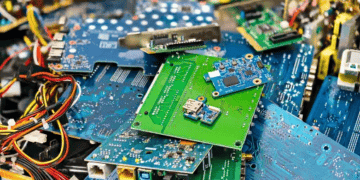Recent data has highlighted a significant increase in electrical waste in the European Union, prompting calls from environmental organizations for a comprehensive revision of the Waste Electrical and Electronic Equipment (WEEE) Directive. In 2021, the EU registered nine million tonnes of WEEE, marking a 3.9% increase from the previous year and contributing to a trend that is seen as a challenge to establishing a more circular economy.
According to Eurostat, the EU’s statistics body, over 13 million tonnes of electrical and electronic equipment (EEE) were sold in the EU in 2021, representing an increase of over 85% since 2013. A coalition of 27 environmental organizations has recently submitted a joint position to the European Commission, emphasizing the need for an urgent update to the WEEE Directive.
The coalition’s position paper states that the original directive, enacted in 2012, was innovative but has become outdated due to evolving challenges and technical developments in managing EEE. The focus of the directive on end-of-life treatment is deemed no longer sufficient, necessitating a rapid and fundamental revision, expansion, and update.
The organizations propose transforming the WEEE Directive into a Regulation, which would have immediate effect, establishing harmonized and legally binding rules across Europe. Key recommendations for the revision include enhancing repair and reuse initiatives, strengthening extended producer responsibility, stopping illegal exports, and prohibiting the destruction of unsold WEEE.
Edoardo Bodo, an environmental policy officer at RREUSE, a member of the coalition, advocates for specific reuse targets. He points out a significant flaw in the EU’s current WEEE management, where producers are permitted to recycle all items, even those still functional, without discrimination.
Fanny Rateau, a programme manager at the Environmental Coalition on Standards, highlights the growing concern over electronics consumption and its impact on the planet. She notes that the average EU citizen contributes over 16kg of electronic waste annually, while the current directive falls short in mitigating the environmental consequences.
Barbara Metz, the executive director of Environmental Action Germany, adds that producers currently face minimal financial repercussions for treated WEEE, as only 50% of it is collected. She suggests that producers should be more involved in WEEE return networks with legally binding collection and reuse targets, and those offering short-lived and poorly repairable equipment should incur higher costs.
Discover supply chain news insights on The Supply Chain Report. Enhance your international trade knowledge at ADAMftd.com with free tools.
#EUEnvironmentalPolicy #WEEEDirective #ElectricalWaste #CircularEconomy #EwasteManagement #SustainableTech #EURecycling #EnvironmentalAction #EwasteRecycling #WEEERegulation #RepairReuseRecycle #GreenElectronics #SustainableFuture #EnvironmentalCoalition #EdoardoBodo #FannyRateau #BarbaraMetz #EwasteReduction #TechSustainability















